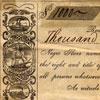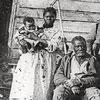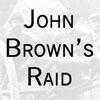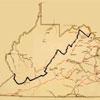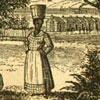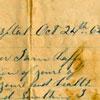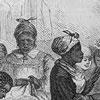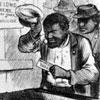Download Transcript: Emancipation Proclamation
At the beginning of the Civil War, many soldiers in the Union Army did not have strong opinions about slavery. As the months turned into years, though, a growing number of Northern soldiers came to believe in the necessity of freeing the slaves, in part to guarantee that such a conflict would not occur again.
During the summer of 1862, Abraham Lincoln decided it was a political and military necessity to emancipate Southern slaves. Lincoln hoped that freeing the slaves would undercut the Confederacy by removing a source of labor that sustained their war efforts. It was also designed to provide a new purpose to the war, and perhaps deter European countries from assisting the Confederacy. Lincoln announced the Emancipation Proclamation after Lee’s invasion of the North was stymied at the Battle of Antietam. The Proclamation declared, “That on the first day of January in the year of our Lord 1863, all persons held as slaves within any State or designated part of a State … in rebellion against the United States, are, thenceforward, and forever free.” The Union would not fight not only for a restored United States, but for one without slavery.
In this video, historian Chandra Manning analyzes a Union soldier’s letter and his reference to the Emancipation Proclamation. This letter was written in 1862 by a soldier named Jasper Barney to his brother. Barney wrote from the hospital with an update on his health and his opinion on the Emancipation Proclamation.
Examine the first page of Barney's letter:
Read a transcription of the entire letter:
Mound City Hospital Oct. 24th ’62
Dear Afectionate brother I am happy to acknowlledge the reception of yours of the 20th and to hear of your sound health fore it is a great blessing and something I haven’t had fore some time and I begin to thin I never be able to perform the duties of camp life again … My wound is getting along fine and a good deal better then the doctor or myself anticipated I think it will be healed up in a few weeks but I cant tell whether I will have as great use of it as I had before or not. My health is not very good I have a pain in my brest and also neuralgia in the hand last night I had considerable fever but I feel better to day. I have wrote to all our folks since I cam hear but I haven’t got any answers from none yet. I haven’t heard from father or Will fore nearly three months. Now by lady love is more attentive fore I got a letter from her yesterday. She is all right on the goose question.
I have wrote to my officers to send me a furlow and I will get it if it is in there power to do so. You say in your letter that you or your Regt is not in fore freeing the negroes I am sory to heare it you wanted to know what I and my comrades thot of the negro question. I think old Abes proclamation is all right and there is very few old soldiers that is against it it is my opinion that yourself and the greater part of your Regiment will be in favor of it before you are in the service six months. I was of the same opinion of your self when I first came in service but I have learned better. You said you thought the thing would come to a finish by spring if the negroes was left alone but I think you will soon find out different fore it is my opinion that the ware never will come to a Close while the nogroes is left wheare they are to rais supplies fore the rebel army. Even if we could suppress the rebellion and leave the main root wheare it was before, it wouldent be long before they would try the same game as before … but if we take a way the main root of evil and confiscate all ther property they will have nothing to fight for heareafter…. Old Abe gave them ninty days and that was long enough fore them to come to terms and saved tghere property and negroes but is seems like they wanted to go the whole hog or none. Now I think it perfectly right to take the hog and leave them none and then if they aint satisfied I am in fore banishing ever Rebel and rebel simpathiser from the U.S. I am a whole sole Union man and believe in giving the rebels a lesson to be remembered in after generations then we will never be troubled with civil war again.
Well I think I give you a very good sample of the opinions of myself nad comrades. Hoping you will pronounce it good I will close the subject by hoping to see Abrahams proclamation on confiscation and Emancipation carried into effect….
P.S. I am not in favor of freeing the negroes and leaving them to run free and mingle among us neither is sutch the intention of old Abe but we will send them off and colonize them the government is already making preperations fore the same and you may be assured it will be carried into effect. I have wrote a great deal more than I felt able to when I set down and I have nothing more of importance to communicate at present therefore I will come ot a cloe by requesting you to write soon under the present circumstances you will please escuse poore writing and mistakes.
Address J.R. Barney
Ward H Mound City Hospital
Illinois
I remain your affectionate brother
Jasper Barney
Source: Roy Rosenzweig Center for History and New Media, Analyzing Civil War Letters Letter #1 (Fairfax, VA, 2011), accessed September 20, 2011. Full video in Roy Rosenzweig Center for History and New Media and Loudoun County Public Schools, “Source Analysis: Civil War Letters,” Foundations of U.S. History, accessed September 16, 2011; 1. Jasper Barney, “Jasper Barney to His Brother,” letter, October 24, 1862, Foundations of U.S. History: Virginia History as U.S. History; John Dinsmore Papers, Illinois State Historical Library.



